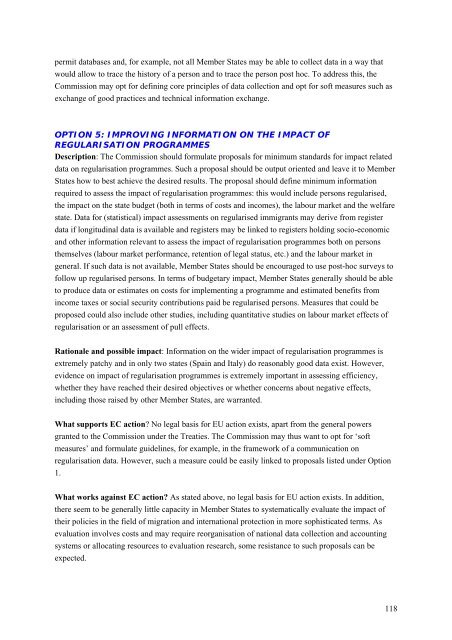REGINE Regularisations in Europe Final Report - European ...
REGINE Regularisations in Europe Final Report - European ...
REGINE Regularisations in Europe Final Report - European ...
You also want an ePaper? Increase the reach of your titles
YUMPU automatically turns print PDFs into web optimized ePapers that Google loves.
permit databases and, for example, not all Member States may be able to collect data <strong>in</strong> a way that<br />
would allow to trace the history of a person and to trace the person post hoc. To address this, the<br />
Commission may opt for def<strong>in</strong><strong>in</strong>g core pr<strong>in</strong>ciples of data collection and opt for soft measures such as<br />
exchange of good practices and technical <strong>in</strong>formation exchange.<br />
OPTION 5: IMPROVING INFORMATION ON THE IMPACT OF<br />
REGULARISATION PROGRAMMES<br />
Description: The Commission should formulate proposals for m<strong>in</strong>imum standards for impact related<br />
data on regularisation programmes. Such a proposal should be output oriented and leave it to Member<br />
States how to best achieve the desired results. The proposal should def<strong>in</strong>e m<strong>in</strong>imum <strong>in</strong>formation<br />
required to assess the impact of regularisation programmes: this would <strong>in</strong>clude persons regularised,<br />
the impact on the state budget (both <strong>in</strong> terms of costs and <strong>in</strong>comes), the labour market and the welfare<br />
state. Data for (statistical) impact assessments on regularised immigrants may derive from register<br />
data if longitud<strong>in</strong>al data is available and registers may be l<strong>in</strong>ked to registers hold<strong>in</strong>g socio-economic<br />
and other <strong>in</strong>formation relevant to assess the impact of regularisation programmes both on persons<br />
themselves (labour market performance, retention of legal status, etc.) and the labour market <strong>in</strong><br />
general. If such data is not available, Member States should be encouraged to use post-hoc surveys to<br />
follow up regularised persons. In terms of budgetary impact, Member States generally should be able<br />
to produce data or estimates on costs for implement<strong>in</strong>g a programme and estimated benefits from<br />
<strong>in</strong>come taxes or social security contributions paid be regularised persons. Measures that could be<br />
proposed could also <strong>in</strong>clude other studies, <strong>in</strong>clud<strong>in</strong>g quantitative studies on labour market effects of<br />
regularisation or an assessment of pull effects.<br />
Rationale and possible impact: Information on the wider impact of regularisation programmes is<br />
extremely patchy and <strong>in</strong> only two states (Spa<strong>in</strong> and Italy) do reasonably good data exist. However,<br />
evidence on impact of regularisation programmes is extremely important <strong>in</strong> assess<strong>in</strong>g efficiency,<br />
whether they have reached their desired objectives or whether concerns about negative effects,<br />
<strong>in</strong>clud<strong>in</strong>g those raised by other Member States, are warranted.<br />
What supports EC action? No legal basis for EU action exists, apart from the general powers<br />
granted to the Commission under the Treaties. The Commission may thus want to opt for ‘soft<br />
measures’ and formulate guidel<strong>in</strong>es, for example, <strong>in</strong> the framework of a communication on<br />
regularisation data. However, such a measure could be easily l<strong>in</strong>ked to proposals listed under Option<br />
1.<br />
What works aga<strong>in</strong>st EC action? As stated above, no legal basis for EU action exists. In addition,<br />
there seem to be generally little capacity <strong>in</strong> Member States to systematically evaluate the impact of<br />
their policies <strong>in</strong> the field of migration and <strong>in</strong>ternational protection <strong>in</strong> more sophisticated terms. As<br />
evaluation <strong>in</strong>volves costs and may require reorganisation of national data collection and account<strong>in</strong>g<br />
systems or allocat<strong>in</strong>g resources to evaluation research, some resistance to such proposals can be<br />
expected.<br />
118
















